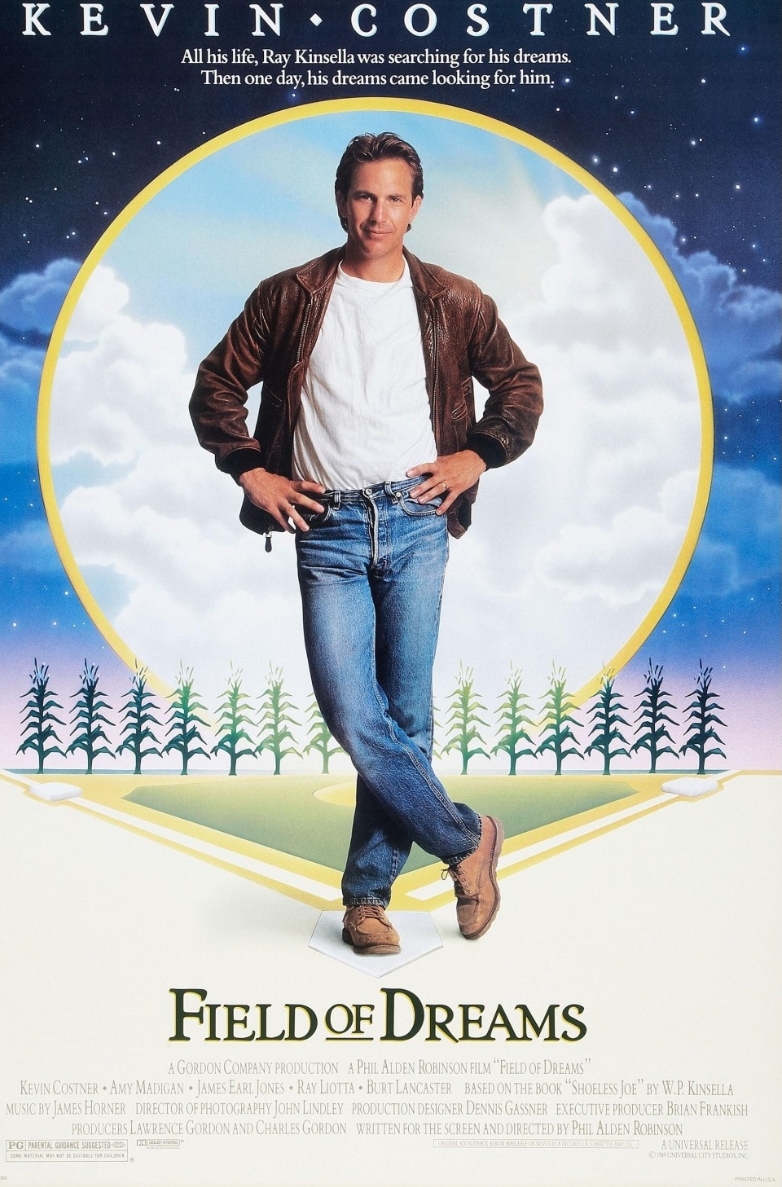Field of Dreams (1989), starring Kevin Costner, is a heartfelt, magical film that blends themes of family, redemption, and following one’s dreams. Here’s a detailed breakdown of the movie:
Plot Summary
The story revolves around Ray Kinsella (played by Kevin Costner), a farmer in Iowa who hears a mysterious voice whispering, “If you build it, he will come.” Despite his financial struggles and doubts from others, Ray interprets this as a call to build a baseball field on his farm. He follows his intuition and builds the field, which sets off a chain of extraordinary events.
Themes and Symbolism
Faith and Obedience
- The movie emphasizes taking leaps of faith even when the outcomes are uncertain. Ray’s decision to plow his cornfield and build a baseball diamond despite financial risks symbolizes trust in a higher, unseen purpose.
Reconciliation and Redemption
Central to the story is Ray’s strained relationship with his late father. The baseball field becomes a metaphor for healing old wounds and finding closure.
Second Chances
- The field allows disgraced or forgotten baseball players from the past, like Shoeless Joe Jackson and other members of the infamous 1919 Chicago White Sox team, to relive their dreams.
Dreams and Purpose
- Ray’s journey is about following his dreams and helping others achieve theirs. The field becomes a place where characters confront their regrets and rediscover meaning.
Key Characters
Ray Kinsella
- A dreamer who takes a huge risk to build the baseball field, ultimately finding personal healing and purpose.
Shoeless Joe Jackson (Ray Liotta)
- A legendary baseball player who represents redemption and the magic of second chances. He’s the first to appear on the field, validating Ray’s actions.
Terence Mann (James Earl Jones)
- A reclusive writer whom Ray convinces to join his quest. Mann becomes a crucial partner in understanding the field’s purpose.
Archie “Moonlight” Graham (Burt Lancaster and Frank Whaley)
- A doctor who once dreamed of being a baseball player. The field allows him to fulfill that dream, even briefly.
John Kinsella
- Ray’s deceased father, who appears on the field, symbolizing reconciliation and healing.
Memorable Moments
- “If you build it, he will come”: The mysterious voice sets the entire story in motion.
- The field materializing as a gateway to the past: The ghosts of baseball players use the field to play the game they loved.
- Father-Son Catch: The film’s emotional climax where Ray and his father, John, play catch, symbolizing forgiveness and reconnection.
Key Takeaways
- Field of Dreams is not just about baseball; it’s a story about faith, family, and the power of dreams to heal and unite.
- It emphasizes listening to inner guidance and taking risks for things that truly matter.
- The movie reminds viewers of the timelessness of love, reconciliation, and the human desire to connect with the past.
Cultural Impact
- The film has become iconic, with lines like “If you build it, he will come” entering popular culture.
- The actual baseball field in Dyersville, Iowa, has become a tourist attraction.
- It resonates as a story of hope and the enduring magic of America’s pastime, baseball.
Field of Dreams symbolizes trust in a higher, unseen purpose through its central narrative of Ray Kinsella responding to a mysterious voice that urges him to take seemingly irrational actions. The film explores themes of faith, intuition, and purpose in the face of uncertainty and doubt.
How It Symbolizes Trust in the Unseen
The Voice’s Cryptic Message
- The voice that Ray hears (“If you build it, he will come”) offers no clear explanation. Trusting the voice requires Ray to step into the unknown and act without full understanding. This mirrors the concept of faith, where one believes in a higher purpose or calling without tangible evidence.
Building the Baseball Field
- Ray plows under his cornfield, risking his livelihood and family’s financial stability. This action represents a leap of faith—sacrificing something tangible and secure for the promise of something unseen and uncertain.
The Field as a Gateway to Redemption
- The completed baseball field becomes a place where long-dead players, like Shoeless Joe Jackson, return to relive their dreams and redeem themselves. This supernatural element reinforces the idea of a higher plan at work, one that Ray could not foresee but trusted enough to bring into reality.
Encounters Along the Journey
- Ray’s journey to find Terence Mann (James Earl Jones) and Archie “Moonlight” Graham demonstrates his willingness to follow the voice’s guidance without fully understanding its purpose. Each step reveals more of the plan, showing that trust in the process leads to fulfillment.
Reconciliation with His Father
- The ultimate purpose of the field is revealed when Ray reconnects with the spirit of his father, John Kinsella. This emotional resolution highlights how trusting the unseen can lead to profound personal healing and closure.
Lessons on Trust and Faith
Acting Without Complete Understanding
- Ray’s actions symbolize the kind of trust required to follow a calling, even when the outcome is unclear or the path seems illogical.
Challenges and Doubts
- Ray faces criticism and skepticism from his family and community, yet he remains steadfast. This reflects the tension between worldly logic and spiritual faith.
Rewards of Trust
- By trusting in the voice, Ray not only creates a miraculous space for others but also finds his own healing and reconciliation. The payoff reinforces the value of faith in the unseen.
Spiritual and Philosophical Connections
- Faith and Providence: The film parallels the idea of divine providence, where individuals are called to act as part of a larger, incomprehensible plan.
- Higher Purpose in Everyday Life: The field serves as a metaphor for believing in something greater than oneself, even when society or logic challenges that belief.
Field of Dreams portrays trust in a higher, unseen purpose as the courage to act on faith, embrace uncertainty, and believe that one’s sacrifices contribute to something meaningful beyond immediate understanding. Through Ray’s journey, the film shows that such trust often leads to profound personal and collective transformation.








One Response
And to give an old quote: “And now the rest of the story…”: As I recall watching the end of the movie, is a lineup of car headlights as far as the eye can see,.
Now others appear to have caught on to the purpose of building the baseball field.